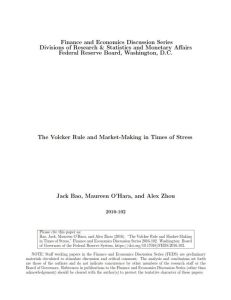Join getAbstract to access the summary!

Join getAbstract to access the summary!
Jack Bao, Maureen O’Hara and Alex Zhou
The Volcker Rule and Market-Making in Times of Stress
Federal Reserve Board, 2016
What's inside?
Has the Volcker Rule unintentionally curbed liquidity in the corporate bond market?
Recommendation
Economists Jack Bao, Maureen O’Hara and Alex Zhou look into whether regulators have gone overboard in their curtailing of the financial sector’s activities following the 2008 financial crisis. They examine the Volcker Rule, one of the crisis-inspired regulations, and its impacts so far on liquidity in the corporate bond market. Their findings describe a butterfly effect in the financial ecosystem: The commendable aim of protecting taxpayers from banks’ speculation can have harmful unintended consequences. getAbstract suggests this scholarly, illuminating analysis to regulators, financial executives, broker dealers and risk managers.
Summary
About the Authors
Jack Bao and Alex Zhou are economists at the Federal Reserve Board. Maureen O’Hara is a finance professor at Cornell University.

















Comment on this summary